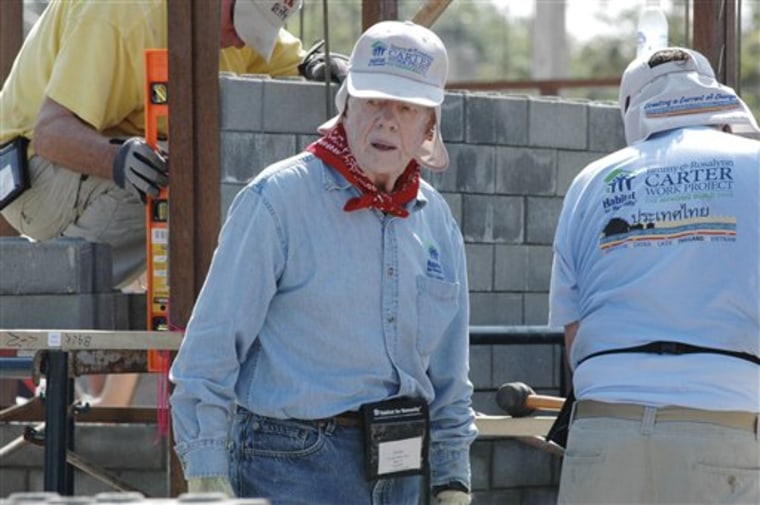Former U.S. President Jimmy Carter said Monday he was pressed by his advisers to attack Iran during the hostage crisis there more than 30 years ago but resisted because he feared 20,000 Iranians could have died.
Islamist militants stormed the U.S. Embassy in Tehran on Nov. 4, 1979, and seized its occupants. Fifty-two Americans were held hostage for 444 days.
Carter said one proposed option was a military strike on Iran, but he chose to stick with negotiations to prevent bloodshed and bring the hostages home safely.
"My main advisers insisted that I should attack Iran," he told reporters in the northern Thai city of Chiang Mai, where he was helping build houses for Habitat for Humanity. "I could have destroyed Iran with my weaponry. But I felt in the process it was likely the hostages' lives would be lost, and I didn't want to kill 20,000 Iranians. So I didn't attack."
The hostages were released on Jan. 20, 1981, just minutes after the swearing in of President Ronald Reagan, whose victory over Carter is largely attributed to the crisis.
The former president has commented in the past on how military action had been an option but that he feared a death toll in the tens of thousands, according to Carter spokeswoman Deanna Congileo.
Carter and his wife, Rosalynn, are among 3,000 volunteers from 25 countries working with Habitat for Humanity this week to help build and repair homes along the Mekong River in Thailand, Vietnam, China, Cambodia and Laos.
The homes in Cambodia are being built for families currently living in a garbage dump, the ones in Vietnam are for fishermen who now live on their boats, and the project in China involves construction of an apartment building in a part of Sichuan province devastated by a 2008 earthquake.
Habitat for Humanity's Chief Executive Officer Jonathan Reckford said the Georgia-based nonprofit group would construct houses for 50,000 families in the Mekong region over the next five years.
"In an area of the world where many people live in deplorable conditions, we have a chance to help families improve their housing," said Carter, wearing sneakers, jeans and a work shirt.
He and his wife spent Monday helping build 82 homes in honor of Thai King Bhumibol Adulyadej, who celebrates his 82nd birthday next month.
He was joined by several regional celebrities, including Chinese movie star Jet Li and Japanese football legend Hidetoshi Nakata.
Since its founding in 1976, Habitat says it has built and rehabilitated more than 300,000 homes worldwide, providing simple shelter for 1.5 million people.
